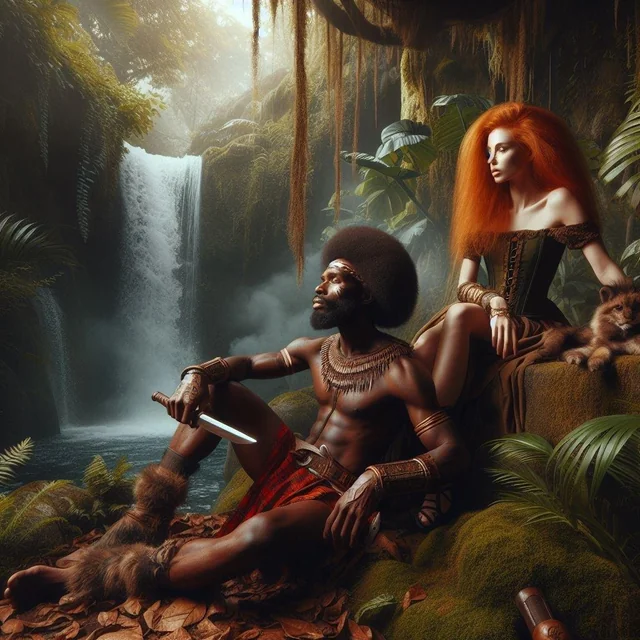The Battle For Black Hair!
- blackcoralinc2021

- Oct 13, 2023
- 4 min read
Because of Climate Change Protective Hairstyles May Soon Become The Global Norm!

Many Schools and Workplaces in the USA are opposed to the Crown Act that makes hair discrimination based on natural and protective hairstyles illegal. Similar to your skin, your hair is incredibly vulnerable to sun damage. A high-quality heat protection spray all year round is crucial to Caucasians and melanated people alike, and not just for when using heated styling tools. In addition to this, as the air-quality worsens and green house gases increase, this can cause damage to the hair proteins, depriving the scalp of oxygen. Colder weather also directly impacts your hair, your hair dries out as pollutants stay around longer in colder months. This can lead to hair breakage, potentially leading to hair loss throughout the winter. Additionally, your favorite woolly hat may be keeping you warm, but the increase in sweat and oils on your head, can also ultimately lead to hair thinning and loss.
Exposure to high heat changes the shape of your hair's keratin strands. Extreme Temperatures over time convert the a-keratin to B-keratin, which eventually leads to weaker hair that has lost its elasticity and become more prone to damage. Caucasian men are most likely to experience hair loss than any other ethnic group and thinning hair often becomes more noticeable during their mid-thirties. You're less likely to experience male pattern baldness if you're of Chinese or Japanese descent. Male pattern baldness doesn't typically affect Native American, First Nations and Alaska Native peoples. Since the late 19th century, some Black people who have more tightly curled hair use chemicals that “relax” or “perm” the hair or heated tools like hair irons or hot combs to straighten their hair.
For many Black people, altering the texture of their hair is considered essential to social and economic success and reducing tension. Hair straightening has long been seen as a way to assimilate and make those unfamiliar with Black hair more comfortable with their presence. By keeping to natural styles young people are saying to the dominant society I do not wish to assimilate and I do not wish to spend money and time injuring my hair to make you feel comfortable with my ethnicity.
Hair discrimination is rooted in systemic racism, and its purpose is to preserve white spaces. Policies that criminalize and prohibit natural hairstyles, like afros, braids, bantu knots, and locs, have been and continue to be used to justify the removal of Black children from classrooms, and Black adults from their employment. With no nationwide legal protections against hair discrimination, Black people are often left to risk facing consequences at school or work for their natural hair or invest time and money to conform to Eurocentric professionalism and beauty standards.
The exceptional nature of Black hair goes beyond just cultural differences. The elasticity and tight coils of Black hair cause it to have unique needs. The physical attributes make it more susceptible to breakage. It cannot easily be straightened without damaging the hair. Black people often choose to wear “protective hairstyles” like braids, twists, and locs to maintain healthy hair. These hairstyles can be worn for long stretches of time without constant manipulation. The alternative is often to use chemical or heat straighteners that can damage the hair in the short and long term it has also been found that many companies secretly put chemicals in Black Hair products that cause infertility, cancer hormonal and DNA damage and fibroids in women. Many of these chemicals are not listed in ingredients and not found in hair products marketed to white people.
Another weather condition you may not even realize affects your hair is ultraviolet radiation (both
UVA and UVB light) from the sun. UV light causes hair to lighten and become brittle. Melanin
pigments (especially those in dark hair) offer some antioxidant protection against UV damage by
helping prevent breakage of the disulfide bonds in hair proteins but those with blond, grey or white
hair are more prone to damaging effects of the sun. Below the surface UV radiation has mutating effects on cell DNA causes oxidative stress. This inflammation alters the amino acids (especially tryptophan, cystine, tyrosine, and histidine) in hair shaft, degrades moisturizing lipids, and breaks down the melanin pigments that help protect hair from UV light.
Black hair is also an expression of identity and culture. It’s a representation of history and carries deep emotional significance. Historically, Black hair has carried a profound symbolism. Cornrows, locs, twists, afros, bantu knots, and more all have historic connections to Black pride, culture, religion, and history, which makes wearing these styles all the more significant. For many Caucasians black hair style is a representation of a free mind unencumbered by white supremacist indoctrination and it scares them as it reflects a mindset opposed to assimilation and control.
Historically The Afro was the most popular style of Ancient Egypt, followed by locs and braids. Some school policies that ban natural and protective styles are grounds for discipline or removal from school. Because of this, Black students across the country have been asked to cut or straighten their hair to meet dress codes and grooming policies. Some school districts have banned specific Black hairstyles, which prevent students from attending school events like prom, extracurricular and sports activities, and even graduation. Ironically white children in some of these schools can wear the same styles without repercussion because the goal is to force compliance to White Supremacist paradigms of beauty. Climate change also affects the quality of the air we breathe, filling it up with allergens and pollutants. And, air pollution, in turn, also damages hair growth proteins. The greater the exposure to these pollutants, as happens in urban areas, the greater the problem. Dust motes and pollutants also settle on the skin of the scalp, which clogs the pores and deprives them of an adequate supply of oxygen.





Comments